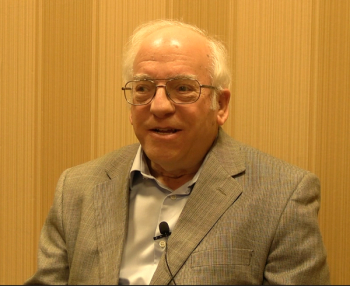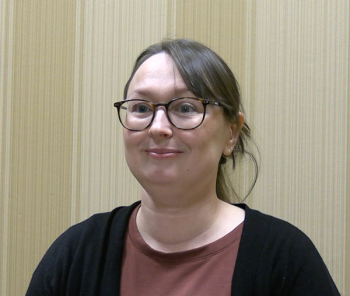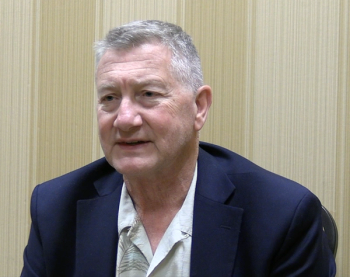
Ep. 38: Being Prepared Isn’t Just for Boy Scouts
In this episode of Analytically Speaking, explore the intersection of forensic science and cannabis research with Brent Wilson as he shares insights on analytical chemistry and standards.
Welcome to “Analytically Speaking,” the podcast from LCGC International and Spectroscopy.
In this episode, podcast co-hosts Dwight Stoll and James Grinias speak with Brent Wilson. Wilson is a research chemist and coordinator of the Cannabis Research Program in the Chemical Sciences Division at the National Institute of Standards & Technology (NIST) in Gaithersburg, Maryland. He received his B.S. degree in Chemistry from Greensboro College followed by a M.S. degree in Chemistry from the same institution. He then moved south to pursue a Ph.D. in Chemistry at the University of Central Florida, training in the lab of Andres D. Campiglia.
In a wide-ranging conversation, we discuss the influence of 2000’s television shows such as CSI on Brent’s interest in forensic science and analytical chemistry, and how an informal interview at a poster session ultimately led to the position he now holds at NIST. Wilson shares how he navigated the educational landscapes in forensic science and chemistry, both at the undergraduate and graduate levels. We discuss the evolution of cannabis standards and analytical characterization in recent years, and Wilson shares his perspective on the importance of standards in general, the birth of a reference material, and the significant effort it takes to bring these materials to the point where analytical scientists like us can purchase them. Wilson also describes some of his work on low-temperature emission spectroscopy techniques, where molecule exhibit much narrower and specific emission bands compared to room temperature detection. Wilson also shares more about the life of a scientist within NIST, from day-to-day activities, competing for federal funding, and more. Finally, Wilson shares some professional advice, including the importance of being prepared and adaptable, the value of talking with people at conferences, and the importance of establishing and maintaining relationships over the course of one's career.
Literature Discussed:
- Wilson, W. B.; Urbas, A. A.; Jensen, H.; Sander, L. C. High-Throughput LC-PDA Method for Determination of Δ9-THC and Related Cannabinoids in Cannabis Sativa. Forensic Chemistry 2024, 41, 100610.
https://doi.org/10.1016/j.forc.2024.100610 . - Wilson, W. B.; Abdur-Rahman, M. Determination of 11 Cannabinoids in Hemp Plant and Oils by Liquid Chromatography and Photodiode Array Detection. Chromatographia 2022, 85 (2), 115–125.
https://doi.org/10.1007/s10337-021-04114-y . - Hayes, H. V.; Wilson, W. B.; Sander, L. C.; Wise, S. A.; Campiglia, A. D. Determination of Polycyclic Aromatic Hydrocarbons with Molecular Mass 302 in Standard Reference Material 1597a by Reversed-Phase Liquid Chromatography and Stop-Flow Fluorescence Detection. Anal. Methods 2018, 10 (23), 2668–2675.
https://doi.org/10.1039/C8AY00760H . - Arif, S.; Al-Tameemi, M.; Wilson, W. B.; Wise, S. A.; Barbosa, F.; Campiglia, A. D. Low-Temperature Time-Resolved Phosphorescence Excitation Emission Matrices for the Analysis of Phenanthro-Thiophenes in Chromatographic Fractions of Complex Environmental Extracts. Talanta 2020, 212, 120805.
https://doi.org/10.1016/j.talanta.2020.120805 .
More about our hosts:
Dwight Stoll, PhD:
Dwight R. Stoll is a professor of chemistry at Gustavus Adolphus College in St. Peter, Minnesota. He received his PhD from the University of Minnesota, under Professor Peter Carr, working on the development of fast, comprehensive two-dimensional liquid chromatography (2D-LC). Stoll’s current primary research focus is on the development of 2D-LC for both targeted and untargeted analyses. Active research projects in his laboratory touch on most aspects of multidimensional separation methodologies, including optimization strategies, characterization of selectivity in reversed-phase LC, instrument development, and applications in biopharmaceutical analysis. Stoll is the author or co-author of more than 80 peer-reviewed publications and six book chapters and has instructed numerous short courses in 2D-LC. In 2011 he was the recipient of LCGC’s Emerging Leader in Chromatography Award. In 2017 he received the Georges Guiochon Faculty Fellowship, and was recognized with an Agilent Technologies Thought Leader Award. He is also a member of LCGC’s editorial advisory board and is the editor of the “LC Troubleshooting” column in LCGC.
Jerome Workman, Jr., PhD:
Jerome (Jerry) J. Workman, Jr. is the Executive Editor for LCGC and Spectroscopy. He has held positions as CTO, executive VP, senior research fellow, director, and senior scientist at companies of all sizes, from start-ups to world-leading corporations. He has been an adjunct faculty member of four universities and advised multiple graduate students. He has more than 75 U.S. and international patent applications and 30 issued U.S. and international patents and multiple trade secrets, as well as 500+ technical publications, and 20 reference book volumes on a broad range of spectroscopy and data processing techniques. He has received multiple awards from scientific societies, and has taught annual courses in spectroscopy, chemometrics, and statistics for the AOAC, ACS, ISA, FACSS, and at several universities and corporations. He is a Fellow of the American Institute of Chemists (FAIC), the American Society for Testing and Materials (ASTM), and the Royal Society of Chemistry in the UK (FRSC, CChem, CSci). Jerry holds B.A and M.A degrees from Saint Mary's University of Minnesota, and a PhD degree from Columbia Pacific University working in near-infrared spectroscopy. He is an alumnus of both Columbia University Business School and the MIT Sloan School of Management.
About the Analytically Speaking Podcast:
Analytically Speaking, the podcast from LCGC and Spectroscopy, addresses important issues in separation science and analytical spectroscopy. Topics include new analytical techniques, methods, and approaches; the latest trends; advances in instrument and software technology; practical solutions for specific applications; recent papers in the scientific literature and their applicability; challenges and solutions for data analysis and interpretation; analytical chemistry theory and fundamentals (from advanced research to tutorials and troubleshooting); and more. Our regular hosts are Dwight Stoll, PhD, a professor of chemistry at Gustavus Adolphus College in St. Peter, Minnesota, and Jerry Workman, PhD, a spectroscopist, noted author, and currently the Senior Technical Editor of Spectroscopy and LCGC. Dwight covers separation science and Jerry addresses spectroscopy related topics.
Connect with us on social media:
Subscribe to
Email us at
To advertise on the show, contact Stephanie Shaffer at
Newsletter
Get essential updates on the latest spectroscopy technologies, regulatory standards, and best practices—subscribe today to Spectroscopy.




